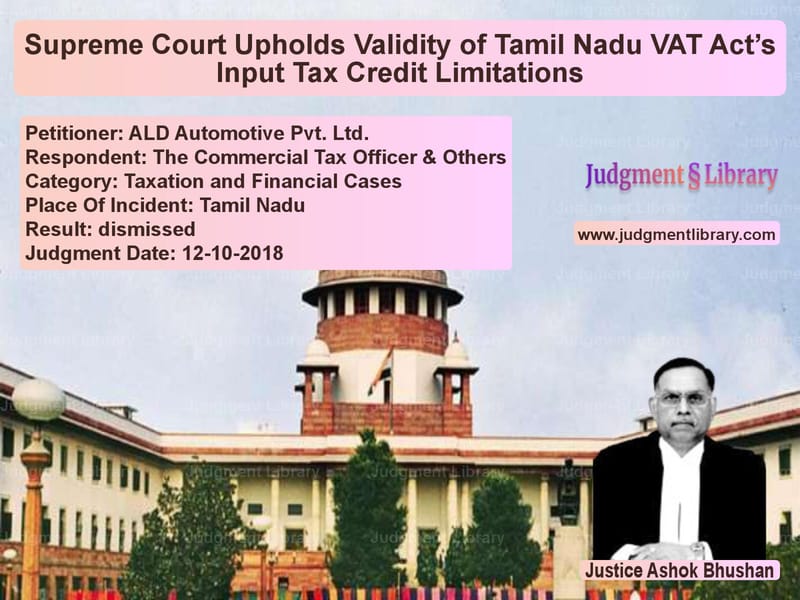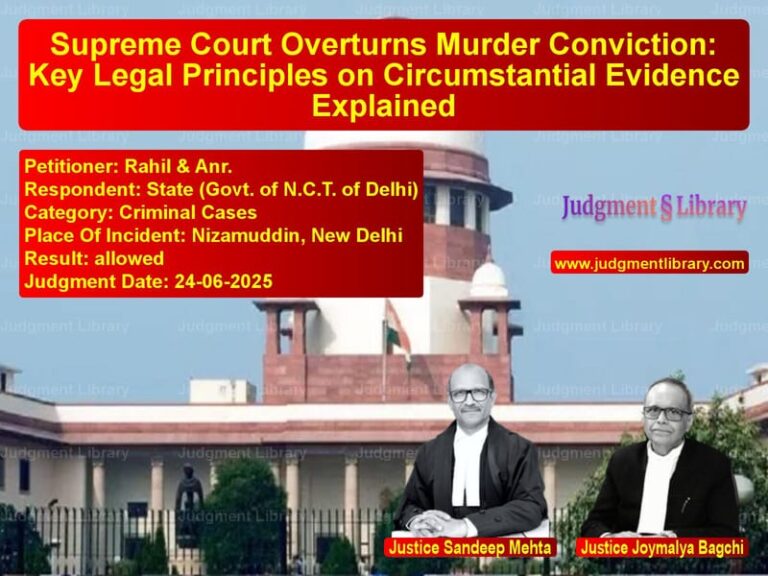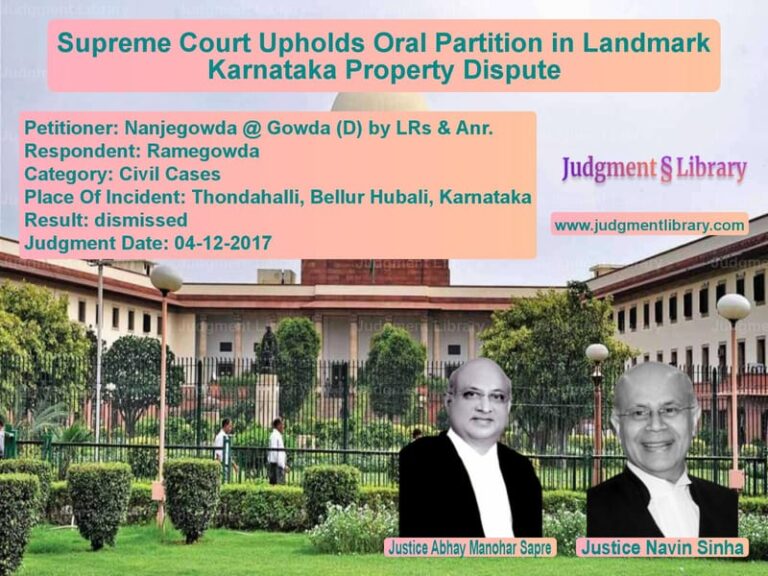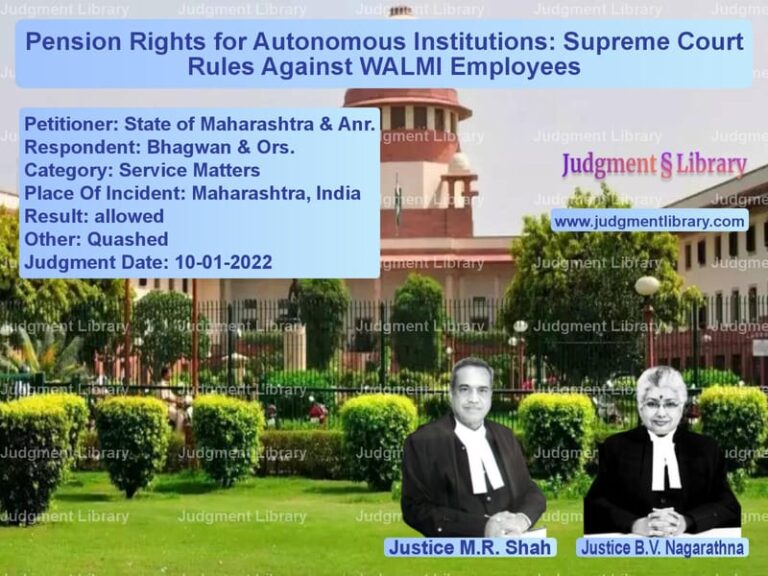Supreme Court Upholds Validity of Tamil Nadu VAT Act’s Input Tax Credit Limitations
The Supreme Court of India delivered a significant ruling in ALD Automotive Pvt. Ltd. vs. The Commercial Tax Officer & Others, addressing the legality of the Tamil Nadu Value Added Tax Act, 2006 (Tamil Nadu VAT Act). The primary issue before the court was whether Section 19(11) of the Tamil Nadu VAT Act, which sets a time limit for claiming Input Tax Credit (ITC), violated constitutional provisions.
Background of the Case
ALD Automotive Pvt. Ltd., a registered dealer under the Tamil Nadu VAT Act, engaged in the business of leasing and managing motor vehicle fleets. The company purchased motor vehicles from registered dealers and claimed ITC under Section 19(2) of the Tamil Nadu VAT Act. However, due to delays in receiving original tax invoices from the dealers, ALD Automotive failed to claim ITC within the stipulated time under Section 19(11).
The company filed revised tax returns to claim the ITC, but the tax authorities rejected the claim, citing non-compliance with Section 19(11), which mandates that ITC must be claimed before the end of the financial year or within 90 days from the date of purchase, whichever is later. Aggrieved by this decision, ALD Automotive filed a writ petition in the Madras High Court, challenging the constitutional validity of Section 19(11).
Arguments Presented by ALD Automotive (Petitioner)
The petitioner argued:
- Section 19(11) imposes an unreasonable restriction on a registered dealer’s right to claim ITC.
- The provision violates Articles 14 and 19(1)(g) of the Constitution by curtailing a substantive right through an arbitrary time limit.
- Input Tax Credit is an essential part of the VAT system, and imposing a rigid timeline for its claim negates its purpose.
- The provision is inconsistent with Section 3(3) of the Act, which allows ITC without specifying a time limit.
- Statutory benefits under a fiscal law should not be denied due to procedural restrictions.
Arguments by the Tamil Nadu Commercial Tax Authorities (Respondents)
The respondents contended:
- Section 19(11) is a necessary safeguard to ensure tax compliance and prevent misuse of ITC.
- The provision is part of a well-structured statutory scheme and does not violate constitutional rights.
- The legislature has the authority to impose reasonable restrictions on fiscal benefits.
- Time limits are essential to maintain tax discipline and avoid fraudulent claims.
- The validity of similar restrictions had been upheld in previous Supreme Court rulings.
Supreme Court’s Observations and Judgment
The Supreme Court extensively examined the validity of Section 19(11) and made the following key observations:
- “Whenever concession is given by statute, the conditions thereof must be strictly complied with to avail such benefits.”
- “ITC is a statutory privilege, not a fundamental right. A dealer can claim it only in accordance with the conditions specified under the law.”
- “Fiscal legislations often impose procedural restrictions to ensure tax compliance and prevent misuse of benefits.”
- “The requirement of claiming ITC within a stipulated time period does not violate Articles 14 or 19(1)(g) of the Constitution.”
- “The High Court correctly upheld the validity of Section 19(11) as a necessary legislative provision.”
Final Ruling
The Supreme Court dismissed the appeals and upheld the Madras High Court’s decision, affirming that:
- Section 19(11) of the Tamil Nadu VAT Act is constitutionally valid.
- Taxpayers must comply with statutory timelines to claim ITC.
- Fiscal provisions designed to regulate tax compliance do not infringe upon constitutional rights.
- There is no inherent conflict between Section 19(11) and Section 3(3) of the Tamil Nadu VAT Act.
Implications of the Judgment
The ruling has several significant implications for businesses and tax authorities:
- Strict Compliance with ITC Claims: Businesses must ensure they claim ITC within the stipulated time to avoid rejection.
- Legislative Authority Upheld: The ruling reinforces the power of state legislatures to impose reasonable restrictions on tax benefits.
- Prevention of Fraudulent Claims: The time limit helps tax authorities monitor and verify claims effectively.
- Guidance for Future Cases: The decision sets a precedent for interpreting time limits in other tax statutes.
Conclusion
The Supreme Court’s ruling in ALD Automotive Pvt. Ltd. vs. The Commercial Tax Officer & Others underscores the importance of adhering to statutory timelines in tax matters. The judgment clarifies that fiscal benefits like ITC are subject to legislative restrictions, and taxpayers must comply with procedural requirements to avail such benefits. The ruling provides legal clarity on the applicability of ITC limitations and reinforces the necessity of tax compliance.
Petitioner Name: ALD Automotive Pvt. Ltd..Respondent Name: The Commercial Tax Officer & Others.Judgment By: Justice Ashok Bhushan.Place Of Incident: Tamil Nadu.Judgment Date: 12-10-2018.
Don’t miss out on the full details! Download the complete judgment in PDF format below and gain valuable insights instantly!
Download Judgment: ALD Automotive Pvt. vs The Commercial Tax O Supreme Court of India Judgment Dated 12-10-2018.pdf
Direct Downlaod Judgment: Direct downlaod this Judgment
See all petitions in GST Law
See all petitions in Tax Refund Disputes
See all petitions in Income Tax Disputes
See all petitions in Judgment by Ashok Bhushan
See all petitions in dismissed
See all petitions in supreme court of India judgments October 2018
See all petitions in 2018 judgments
See all posts in Taxation and Financial Cases Category
See all allowed petitions in Taxation and Financial Cases Category
See all Dismissed petitions in Taxation and Financial Cases Category
See all partially allowed petitions in Taxation and Financial Cases Category







